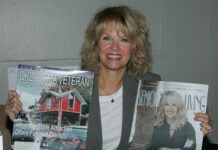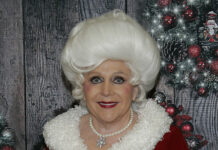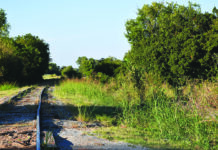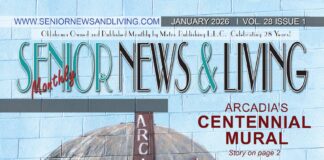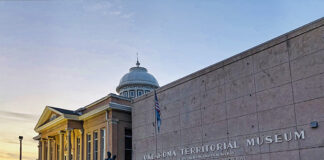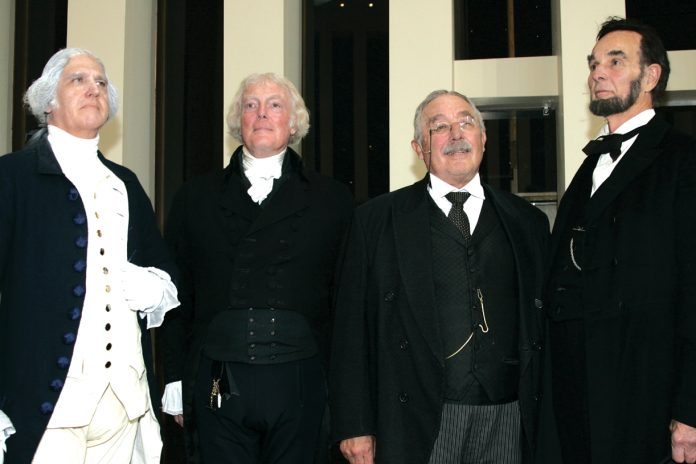
Story and photos by Darl DeVault, Contributing Editor
Four presidential reenactors celebrated Oklahoma Statehood Day before a mostly senior capacity crowd of 300, where President Theodore Roosevelt gave an enthusiastic historical perspective 117 years to the day after he signed the Oklahoma Statehood Proclamation.
The senior historical reenactors portraying presidents who appear on the Mount Rushmore National Memorial in South Dakota gave speeches and answered questions in the free matinee on November 16 at the Oklahoma History Center. The audience listened intently to experienced actor-interpreters playing the “Rushmore Four.” A 7 p.m. ticketed performance saw a more mixed-age crowd attend. The events continue a long-standing initiative by the OHC to share world-class interpreters and their stories with the public.
Professional reenactors portrayed Presidents George Washington, Thomas Jefferson, Abraham Lincoln and Roosevelt dressed in top hats and tails in period attire. The actors have worked together in many previous appearances around the country.
Each president stood as they offered remarks of historical perspective from their eras in the order of their time as president. They invited and answered wide-ranging questions. The men only spoke of modern politics a few times when it applied directly to a significant point in their speeches. The actors stayed in character throughout their session and while posing for photos after the event.
Dan Shippey portrayed President George Washington in a full Revolutionary War uniform and three-cornered hat. The actor founded and directs The Breed’s Hill Institute, an educational nonprofit teaching the history of American liberty. Shippey works as a writer, director and actor in commercial film and theater.
Washington expressed his admiration for the 260-270 brave Maryland soldiers who stood fast during the Battle of Long Island, allowing his main force to withdraw to fight another day. He mentioned several of the dozen survivors of that largest battle of the Revolutionary War by name, calling the men his Marylanders.
The general and commander in chief of the Continental Army spoke the most about how courageous men from all the colonies fought for others’ rights to be free throughout the Revolutionary War. He said he took great pride in how those men grasped the need for unity in fighting for our new democracy.
After answering several questions, the historical interpreter was asked if Washington liked to speak before crowds. He paused for effect, empathically answered “No,” and sat down as the audience reacted with laughter.
President Thomas Jefferson, the author of the Declaration of Independence at Independence Hall in Philadelphia, stressed in his speech the importance of the first words of the preamble to the Constitution, “We the people.” The actor explained that this marked the first time those words were expressed worldwide in a formal government document.
Portraying Jefferson since 1983, professional actor and theater director Bill Barker depicts Jefferson on television, in film and many historical locations. His main reenactment venue as Jefferson is the Thomas Jefferson Foundation at Monticello.
Asked about his devotion to science as president, Jefferson spoke at length about founding a university and the patent office in support of citizens receiving credit for their scientific inventions. Before election to the presidency, he was the first examiner of American patents. An inventor, he said a president’s primary role is to celebrate others’ achievements.
President Abraham Lincoln provided the audience with an overview of America in the years before running for the presidency. Fritz Klein, 74, bears a strikingly uncanny physical resemblance to Lincoln. He spoke at length about the Missouri Compromise of 1820’s failure to stop the spread of slavery.
Klein portrays Lincoln as an actor and speaker since being recruited to do so for a small, local celebration during the bicentennial year. One of the nation’s best-known Lincoln reenactors, he has appeared in 43 states and a variety of films since 1981. He is a member of the National Speakers Association as a full-time actor traveling internationally to portray Lincoln on stage, in feature films, documentaries and speaking engagements.
Klein convinced the actor playing President Theodore Roosevelt to become a professional interpreter in 2003 after watching him perform and noting his physical resemblance to a circa 1915 version of the president.
Roosevelt, retired Huntington, Indiana businessman Gib Young, was the most energetic speaker of the four presidents. He wove many mentions of his associations with Oklahomans and his visit to Comanche peacetime leader Quanah Parker at his Star House in Cache into his speech. He delighted the audience with his “bully” rendition of Roosevelt’s personality, intellect, and zest for life. He said it was proper to speak at length because Roosevelt visited Oklahoma before and after signing the proclamation making Oklahoma a state.
Roosevelt gave a reverent accounting of Oklahomans who had volunteered to charge up San Juan Hill with him in the Spanish-American War.
Not noted in the actors’ speeches is the distinction that Roosevelt is the only president ever awarded the Medal of Honor. In 2001 he was posthumously honored for courage under fire described as “…acts of bravery on 1 July 1898, near Santiago de Cuba, Republic of Cuba, while leading a daring charge up San Juan Hill.”
Roosevelt cited the important dates leading up to Oklahoma’s Statehood Day and engaged members of the audience by asking them questions about American history during his question session.
His zest for the president’s job rose to a zeal of patriotism as he discussed Roosevelt’s role in setting aside large parts of America for its citizens as national parks. In citing his authority as president to protect wildlife and public lands by creating the United States Forest Service, he reeled off a litany of accomplishments for the audience. Starting in 1901, Roosevelt established 150 national forests, 51 federal bird reserves, 4 national game preserves, 5 national parks, and 18 national monuments. Roosevelt’s enabling of the 1906 American Antiquities Act protected approximately 230 million acres of public land.
Although the National Park Service was established 106 years ago with just 35 sites, the actor listed those five parks he had helped include long before the more formal act of Congress created the service. He finished his speech by pointing out how proud Roosevelt would be that America now has more than 400 parks and monuments under what he termed the amazing National Park Service.
The Inasmuch Foundation sponsored the program, coinciding with the OHC’s 17th anniversary and Oklahoma’s 117th Statehood Day in 1907.
The OHC is a division of the Oklahoma Historical Society, seeking public engagement through its affiliation with the Smithsonian Institution and National Archives. It is an accredited member of the American Alliance of Museums. The OHS’s mission is to collect, preserve and share the State’s history and culture of its people. The Territorial Press Association founded the OHS in 1893 to maintain museums, historic sites and affiliates across the state. It chronicles the rich history of Oklahoma through its research archives, exhibits, educational programs, and publications. For more information, visit okhistory.org.






